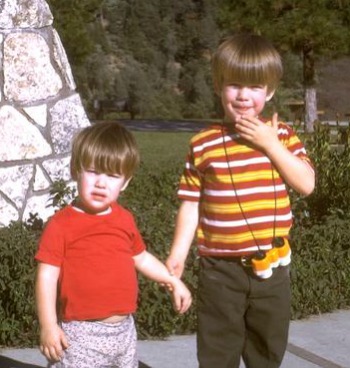Living with an alcoholic spouse is a challenge but as a parent, being under the same roof means you have a greater ability to safeguard your children. Once you separate and your children are shuttling between two home, the question becomes how do you protect your kids from an alcoholic parent. There could be bizarre behavior, angry moods, missed appointments, no meals and much, much worse.
Al J. Mooney, M.D. co-author of the The Recovery Book: Answers to All Your Questions About Addiction And Alcoholism And Finding Health And Happiness In Sobriety recommends talking and educating your children right from the start:

Dr. Al: I think it needs to be totally transparent. The developmental stages require different styles of communication from parents. But you always tell the truth no matter what the age is. I was an example of this.
I was ten years old when my dad went to prison and found his recovery; eleven when he got out of prison and I had already understood. My take home message from all the lies that I was told was that my dad is dead and nobody’s got the guts to tell me.
What kids will do when their observations don’t reconcile with what they’re told, they default. And this is what I did. My default was my dad’s dead and nobody’s got the guts to tell me. Maybe one day I’ll know the truth. Kids actually go to a worst-case scenario, and that is guaranteed to be worse than the truth.
Often, pride and embarrassment and ignorance and expectations, a whole bunch of reasons exist why parents don’t tell the kids the truth. But I know when my dad came home when I was eleven years old, and said, “I’m a criminal. I’ve been in prison. I’m an addict. Now I’m told that if I do these things, I don’t have to die an addict; I can recover,” I felt like the weight was off my shoulders. It wasn’t a pretty picture, but it was the truth, and I knew it was the truth. The worst thing for kids is to hear lies after lies, but they don’t know what the truth is?
Mandy: Let’s say Mom says, “Well, dad didn’t pick you up because he forgot. He has been drinking.” And the kid goes to dad, says, “Dad, mom says that you didn’t pick me up because you were drinking.” And dad says, “That’s mom. She’s just trying to cause trouble. That’s a bunch of lies. She would say that. Why would you listen to her?” Doesn’t that create more conflict for the kids.
Dr. Al: I don’t know that I would say “because he’s drinking” because that says mom is making a value judgment about whether drinking is good or bad, and who knows what they even know. They’re probably hearing from their friends that drinking is exciting and fun and all that.
It’s important for her to read The Recovery Book, consult with professionals, to go to Al-Anon to get a point of reference. She needs to have an awareness herself that says, “You know, from the home study, all the readings, all the meetings and all the help I’ve gotten, I’ve had to accept that your dad has an illness called alcoholism or called addiction, and it makes him behave irresponsibly. We hope that we can find solutions as a family to deal with this.”
Then at some point depending on the ages, not that you want to say it bluntly, but you say, “You know, this is a genetic disease that runs in our family. So learn while you can because you may be there in the next generation, and we’d like to change the family script so it’s not like the one you’re living.
By including the kids with education and some power to understand and get some tools so that this negative becomes something positive in their lives, it could be, real constructive for the kids.
Mandy: At what age do you think a child is mature enough to hear that sort of conversation?
Dr. Al: I think it’s when they can start understanding English, five or six years old. They don’t need to know a lot of details like when we give them the birds and the bees talk.
But you can say, “None of us are having fun here. Dad is sick, and we’re sorry he’s sick. But, we have to take care and love sick people.” And that might be a five- or six-year-old discussion. At eleven and twelve it might be more along the lines of, “I’d like you to learn more about the disease of addiction.” It’s a sickness which the kids are learning now anyway. This idea that it’s a moral issue and stigma is an old, out of date, adult idea. Most of the kids are willing to accept addiction as a disease. It’s the doctors and the adults that have trouble with that.
The eleven-year-old might need to hear more about support, “Go out and let’s study some things on the internet. You’re ready to go to AlaTeen. Come to open A.A. meetings with me, and we’ll learn about these things.”
Click here to keep reading.